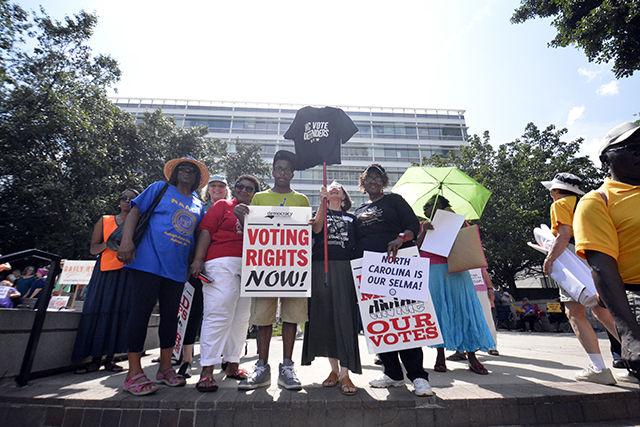This week in Winston-Salem, the trial to determine whether a bill passed by North Carolina’s Republican leadership in 2013 carried an explicit intent of suppressing voter populations that tend to vote democratic.
The bill included provisions that moved polling sites off of college campuses, shortened the early voting period by seven days, eliminated same-day registration and required voters to present photo ID at the polls.
The N.C. NAACP, Department of Justice and several other groups and individual students have joined the lawsuit against Gov. Pat McCrory and the state of North Carolina.
The plaintiffs charge that McCrory’s additions to House Bill 589 put disproportionate strain on poor, Black, Latino and young voters echoing sentiments that led to the passing of the Civil Rights Act of 1965.
House Bill 589 was originally passed as a voter ID bill similar to that of other states and was only 16 pages long. However, when the Supreme Court struck down Section 5 of the Civil Rights Act of 1965, thus allowing states to change their voting laws without federal approval, the bill was extended to 57 pages and packed with extra restrictions.
The new bill then passed the House and Senate within two days of the Supreme Court’s decision after stagnating in the Senate for two months, raising suspicions among opponents of the bill.
Since then, Gov. McCrory has softened the legislation by adding an amendment which allows those who can prove that they do not have a photo ID due to factors outside of their control to vote using alternate methods of identification. Because of this, the voter ID portion of the legislation will not be discussed.
This series of events was the subject of much of the questions directed to Senator Josh Stein, who took the stand on July 21.
Stein said that this action by the Republican leadership is “the most dramatic rewrite of election laws in a generation” and that he does not believe that the bill was intended to protect voter integrity.
Stein also said that he could not recall any debate on the Senate floor as to the discriminatory aspects of H.B. 589, which is uncommon when a bill deals with fundamental rights such as voting.
One of the witnesses to take the stand on Tuesday was a member of a get-out-the-vote group who worked with students during the 2014 election cycle. The defense found several issues with her testimony, focusing on the fact that she could not name any students who did not or could not vote due to H.B. 589, though she said she knew countless students who were unable to vote.
Other student witnesses testifying via recorded video explained their struggles with not being able to vote outside of their precinct and dealing with the changes in the laws.
Peter Levine, a research professor in philosophy at Tufts University with an expertise in the fields of public policy and civic engagement, testified July 20 that voting is a “habit-forming” activity and that a person is more likely to vote in the future if they vote when they are first eligible. Levine cited data that showed a lower baseline of voter turnout when they do not vote early in life.
The plaintiff’s line of questioning revealed that this trend comes from the psychological effect that voting has, which Levine said is a feeling of confidence or feeling “like a voter.” In addition to building confidence, Levine said that, by voting, you are put on contact lists which increases the likelihood that you will be contacted by political groups, which data show also increases the likelihood of voting in the future.
The defense attempted to find weaknesses in his report by tracing the limits of his research, which only compared the data from the 2010 and 2014 elections. In comparison, Levine’s research found that young people were less likely to vote in 2014, which has been referred to throughout the proceedings as a “blockbuster election” because of the outrageous amount of money spent by the primary candidates.
Levine’s research revealed that though college students are in the minority of potential young voters, they are more likely to vote than students who do not go to college.
The defense at one point attempted to nullify the argument that young voters were purposefully discriminated against by suggesting that their numbers were too small to sway an election. In response to this, Levine referred to the 2000 election when approximately 500 votes in Florida decided the election.
A former precinct judge speaking on a condition of anonymity said she is having a hard time seeing the defense’s side of the case.
“We should be making voting easier for people not harder,” she said after leaving the courtroom July 22. “Hopefully the judge will be impartial.”








